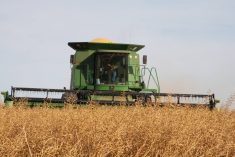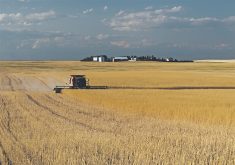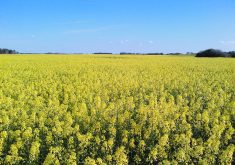India is well on its way to commercializing a genetically modified line of mustard, which could have implications for Canada’s growers.
In October 2022, the country’s Genetic Engineering Appraisal Committee approved the environmental release of DMH-11, a mustard hybrid developed by the University of Delhi that is resistant to insect damage.
The Indian Council of Agricultural Research is now set to conduct field trials of the crop. If those trials are successful and the government gives the crop its final approval, DMH-11 will become the country’s first GM food crop.
Read Also

Gap in emission regulations hamstrings Canadian hybrid truck manufacturer
A B.C. company building hybrid engines for heavy trucks says they have the opportunity to build something leading edge in Canada, but our own laws are stopping them from doing it.
Farmers could have seeds to cultivate in two years, according to an article published by The Wire Science.
DMH-11 yields 28 percent more than national check varieties and 37 more than regional checks, according to senior government officials.
India is one of the world’s leading producers of the crop and the third largest exporter behind Canada and Russia.
Rick Mitzel, executive director of the Saskatchewan Mustard Development Commission, said GM mustard is “not in the cards” for Canada.
“If our customers are saying we absolutely don’t want it, why would we even dabble in it?” he said. “It would sure help with our weed control and some other issues, but if the market doesn’t want it, we’re not going to produce it.”
Canada’s top mustard markets are the United States, Western Europe and Asia.
There are no research trials on GM mustard underway in Canada.
“We do all the research on mustard at Mustard 21, and I can fully guarantee you we’re not working on any type of GMO mustard,” said Mitzel.
SaskMustard has achieved yield advancements without using genetic modification. Its non-GM hybrid brown mustard delivered a 20 percent yield increase over check varieties.
Mitzel isn’t concerned about India’s GM mustard crop somehow appearing in the seed Mustard 21 sells to its Canadian distributors.
“I don’t see that as a real big immediate threat,” he said. “We test the seed before we release it, and we make sure there is nothing there.”
He has read that India plans to identity preserve DMH-11 mustard and sell it domestically. It will not be available for export.
But there is always an outside chance that some of India’s DMH-11 seed could find its way into the international condiment market and that could pose a threat to all mustard shippers.
“I’d be worried that countries like France may start growing more mustard, just to cover off so they don’t have to import anything,” said Mitzel.
But there is also a chance that Canada could gain market share from India if the country commercializes the crop.
“I think their exports to Europe would probably slow down pretty quick if Europe found out they had GMO mustard,” he said.
On the other hand, if India’s yields rise by 28 to 37 percent, there will be a lot more GM mustard available to supply domestic demand and thus more non-GM mustard for the export market.
Contact sean.pratt@producer.com
















